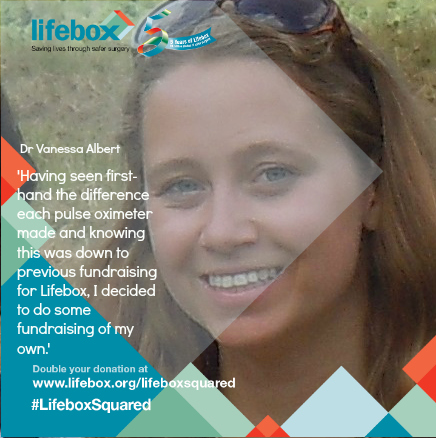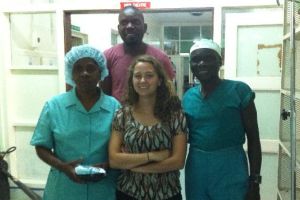
From med student to lead author
But how do you find yourself lead author on the latest research to prove it so?
Lifebox spoke with Dr Vanessa Albert, junior doctor (and medical student at the time of research) about her experiences bridging implementation and academia.
 You’re lead author on a paper about the impact of Lifebox oximeter distribution in Malawi. Can you sum up some key findings from this research?
You’re lead author on a paper about the impact of Lifebox oximeter distribution in Malawi. Can you sum up some key findings from this research?
The paper looked at the implementation of pulse oximeters to hospitals in Malawi alongside a structured training programme and follow up eight months later.
The key findings were:
The pulse oximeters were reliable and in use eight months later
Training improved knowledge about pulse oximetry and this was maintained over time
Data suggested that the use of pulse oximetry reduces the incidence of peri-operative hypoxic episodes and has the potential to improve the safety of anaesthesia in this area.
Did you collaborate with your colleagues in Malawi? If so, how did this come about?
You cannot run and set up a successful implementation project anywhere in the world without fully involving local colleagues and the individual hospitals.
A pulse oximetry ‘champion’ was the key point of contact from Malawi to the Lifebox team. He was a local senior anaesthetic provider who then provided access to the other main hospitals and anaesthetic providers in the country. He will also be there to ensure the pulse oximeters continue to work and be effective and has direct contact with us if there are any issues or improvements that arise.

Why is it important to engage the wider global surgery community with anaesthesia provision in low-resource settings?
Surgery is one of the main causes of morbity and mortality worldwide – and unsafe care compounds the risk. Unsafe anaesthesia can lead to a potentially life-saving operation resulting instead in great harm. Lack of appropriate equipment and training are two of the major contributing factors to this. Awareness of anaesthesia provision in global surgery and the current hurdles it faces worldwide needs to be raised and addressed.
What do you hope this publication will achieve?
I hope that this publication will emphasise the need for safer anaesthesia in low resource settings and encourage the use of this simple measure (pulse oximetry) that can really make a difference.
How do you recommend that medical students get involved in research projects?
As a medical student, being in the “right place at the right time” is often the way that you will end up stumbling across an appropriate research project. However, there are many things you can do yourself to improve your chances of getting involved. Keeping an eye out for potential opportunities and asking your local teams and consultants if they have any projects they are planning and need help with. There are also now a growing numbers of national collaborative projects which can be found just by searching around and are easy to get involved in! And of course there’s the Lifebox-Medsin Rep scheme.
Most importantly, be keen and just ASK!

